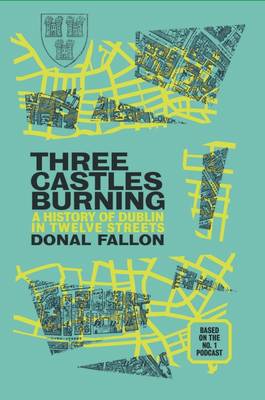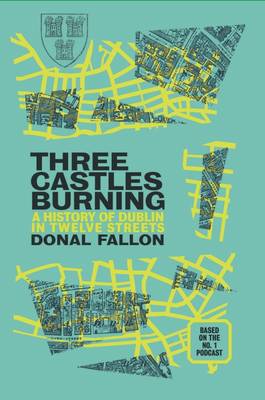
- Afhalen na 1 uur in een winkel met voorraad
- Gratis thuislevering in België vanaf € 30
- Ruim aanbod met 7 miljoen producten
- Afhalen na 1 uur in een winkel met voorraad
- Gratis thuislevering in België vanaf € 30
- Ruim aanbod met 7 miljoen producten
Zoeken
Omschrijving
Eason Favourite Book of the Year 2022
'she is no small town, and this is no small story . . .'
BASED ON THE POPULAR DUBLIN HISTORY PODCAST
A companion to the hugely successful podcast of the same name by Donal Fallon, THREE CASTLES BURNING is an enjoyable wander through some of Dublin's less obvious but more interesting streets and roads such as Henrietta Street, Watling Street, Fownes Street and Kildare Road.
On the Dublin streets we walk every day, there are hidden reminders of the lesser-known heroes and events that have contributed to the evolving story of our capital. The city's motto, 'the obedience of the citizens produces a happy city', may feel outdated and loaded today but the three burning castles of its ancient coat of arms have come to represent the indomitable spirit, creativity and vision that define this big town. Inspired by the No. 1 podcast, Three Castles Burning: A History of Dublin in Twelve Streets champions the activists, workers, architects, poets, migrants, artists and merchants who have made and remade the city we know and love by going beneath the many layers of twelve key streets where they lived and worked. Because, in the city Joyce called the 'Hibernian Metropolis', the disobedience of its citizens is the cornerstone of its past, present and future.
This combination of social, cultural, industrial and commercial, and political history, through the prism of the places where revolutions great and small were sparked, offers the reader a fresh and unexpected take on Ireland's capital city.
'she is no small town, and this is no small story . . .'
BASED ON THE POPULAR DUBLIN HISTORY PODCAST
A companion to the hugely successful podcast of the same name by Donal Fallon, THREE CASTLES BURNING is an enjoyable wander through some of Dublin's less obvious but more interesting streets and roads such as Henrietta Street, Watling Street, Fownes Street and Kildare Road.
On the Dublin streets we walk every day, there are hidden reminders of the lesser-known heroes and events that have contributed to the evolving story of our capital. The city's motto, 'the obedience of the citizens produces a happy city', may feel outdated and loaded today but the three burning castles of its ancient coat of arms have come to represent the indomitable spirit, creativity and vision that define this big town. Inspired by the No. 1 podcast, Three Castles Burning: A History of Dublin in Twelve Streets champions the activists, workers, architects, poets, migrants, artists and merchants who have made and remade the city we know and love by going beneath the many layers of twelve key streets where they lived and worked. Because, in the city Joyce called the 'Hibernian Metropolis', the disobedience of its citizens is the cornerstone of its past, present and future.
This combination of social, cultural, industrial and commercial, and political history, through the prism of the places where revolutions great and small were sparked, offers the reader a fresh and unexpected take on Ireland's capital city.
Specificaties
Betrokkenen
- Auteur(s):
- Uitgeverij:
Inhoud
- Aantal bladzijden:
- 336
- Taal:
- Engels
Eigenschappen
- Productcode (EAN):
- 9781848408722
- Verschijningsdatum:
- 16/11/2022
- Uitvoering:
- Paperback
- Formaat:
- Trade paperback (VS)
- Afmetingen:
- 134 mm x 199 mm
- Gewicht:
- 344 g

Alleen bij Standaard Boekhandel
+ 49 punten op je klantenkaart van Standaard Boekhandel
Beoordelingen
We publiceren alleen reviews die voldoen aan de voorwaarden voor reviews. Bekijk onze voorwaarden voor reviews.











